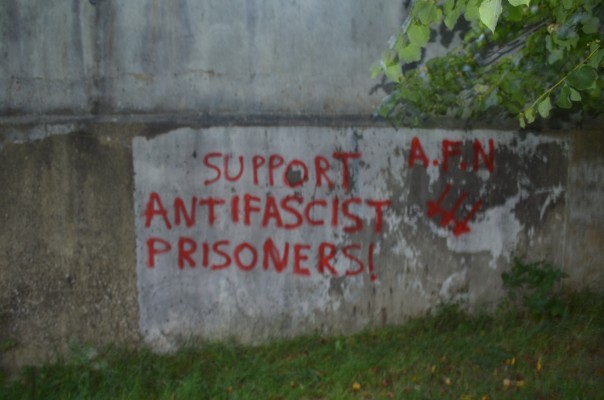It’s been almost ten years since 21-year-old Australian Jock Palfreeman found himself alone one night in Sofia, Bulgaria, confronted by a group of fascist football hooligans he’d witnessed attack two Roma men. In the ensuing altercation Jock was injured and one of the gang, a young man called Andrey Monov, was fatally stabbed. In December 2009, after a lengthy and troubled court process, Jock was found guilty of murder with hooligan intent and attempted murder, sentenced to twenty years jail, and fined several hundred thousand dollars. Successive appeals against his conviction and sentencing, the last to the Bulgarian Supreme Court in July 2011, have all failed, and Jock now faces the prospect of another decade behind bars.
Unlike a number of other Australians who’ve found themselves locked up in foreign prisons, Jock’s imprisonment has not rendered him a celebrity. That’s not to suggest that his case has been ignored: his story has been featured on episodes of the ABC’s Foreign Correspondent (June 2009) and Australian Story (June 2011), been the subject of a book – Every Parent’s Nightmare (2013), by journalist Belinda Hawkins – and has generated periodic press coverage, most recently in an article in The Daily Telegraph, in which journalist Ellen Whinnett writes that Jock is not confident of obtaining parole at his first hearing in December. ‘I have got no-one behind me,’ states Jock. ‘You know what’s ironic? David Hicks (supported) the Taliban and there was more public support for him in Australia than there has ever been for me.’
Last month, Jock was joined by another Australian in Sofia Central prison: 21-year-old John Zakhariev, who has been sentenced to four years jail for terrorist offences. John’s case, like Jock’s, has many troubling aspects, but has generated even less attention, and little if anything in the way of public support.
There is, however, an international grassroots campaign in solidarity with Jock, and actions in support of him have taken place in Australia, Greece, Sweden, United Kingdom, United States and elsewhere over the last few years. As time goes on, Jock’s profile among antifascists in Europe has increased.
Since entering prison, Jock has continued to be politically active. In 2012 he helped to found the Bulgarian Prisoners’ Rehabilitation Association (BPRA), the first association of its kind in that country. The BPRA has campaigned for reform of prison conditions, provided legal support to prisoners, and in 2015 was nominated for a human rights award. Outside of prison, Jock’s case has been adopted as a rallying point for antifascists. In 2014, the 25 July was nominated as ‘International Day of Solidarity with Jock Palfreeman’. In 2015, thanks largely to the efforts of New York City Antifa, this became an ‘International Day of Solidarity with Antifascist Prisoners’, which in 2017 is publicising Jock’s case as well as those of antifascist prisoners in Belarus, Russia and Sweden.
One vital aspect of this work is to encourage correspondence with prisoners, to assure both them and the governmental authorities responsible for their incarceration that they are not forgotten, and that there exists a movement in solidarity with their struggles beyond and against the prison bars. ‘#J25antifa’ also parallels 11 June, the ‘International Day of Solidarity with (Long-term) Anarchist Prisoners’, inaugurated in 2004 just as the so-called Green Scare in the United States began to imprison dozens of activists for ‘eco-terrorism’. While much more can and should be said about these campaigns, it’s certainly the case that both state repression of the environmental movement and increasing fascist attacks upon broader populations engender resistance.
In the case of antifascist movements, the 2017 Greek-Swedish documentary film The Antifascists attempts to look beyond the spectacular scenes often associated with antifascist activity, and to emphasise its connection to and place within broader anticapitalist struggles. (The film will be screening in Australia later this year.) In doing so, The Antifascists articulates and recommends a three-pronged approach to antifascism. First, the deconstruction of fascist slogans and myths. Secondly, the disruption and, where possible, prevention of public assemblies by the extreme right. Finally, resistance to fascist infiltration of public institutions and cultures – especially youth subcultures – in the arts, sports and recreation.
Since the emergence of ‘Reclaim Australia’ and allied groups from early 2015, there have been determined efforts to disrupt extreme-right assemblies. The deconstruction of fascist ideology, on the other hand, is obviously a matter of general and ongoing political education, but also necessitates the specific monitoring and dissemination of information regarding fascist groups and projects. While there have been scattered attempts to conduct this work in Australia, it’s still very much in its infancy, and arguments for its utility are, in my experience, a constant. More broadly, in the ten years since Jock was first arrested, a resurgent extreme right has coalesced across Europe and North America – and with it the need for a more determined response.
In the United States, following Donald Trump’s presidential election win, a re-energised far right has returned to the streets, and on occasion clashed with antifascist activists. In February, in response to protests at his inauguration, Trump tweeted:
Professional anarchists, thugs and paid protesters are proving the point of the millions of people who voted to MAKE AMERICA GREAT AGAIN!
— Donald J. Trump (@realDonaldTrump) February 3, 2017
Currently, over 200 ‘professional anarchists’ arrested at the protests in Washington face felony charges stemming from their participation – and face up to 75 years in prison if convicted. At the other end of the social scale, in May, Jeremy Joseph Christian, the man accused of fatally stabbing two men in Portland, Oregon, when they came to the assistance of two young women he was abusing on a train, shouted at his court hearing ‘Death to Antifa! You call it terrorism, I call it patriotism! You hear me? Die.’ Last month, New Jersey’s Office of Homeland Security and Preparedness added ‘Antifa’ to its list of ‘domestic terrorist’ threats. According to Kim Kelly, writing for Al Jazeera, the OHSP’s report characterises ‘Antifa’ as a group of ‘anarchist extremists’ who ‘focus on issues involving racism, sexism, and antisemitism, as well as other perceived injustices’.
In Australia, the normalisation of fascist and quasi-fascist rhetoric is not confined to the political fringes; or rather, mainstream figures have readily adopted the political themes – principally centred on anti-immigrant and anti-Muslim sentiment and a beleagured white racial identity, but extending to often quite vulgar, but otherwise sadly familiar antisemitic tropes – which so animate the extreme right in this country. Former Labor leader Mark Latham, for example, can happily appear on a neo-Nazi podcast, with barely a peep being made in response; unapologetic at the time, federal MP George Christensen later expressed regret for his own appearance on the same podcast, and even noisily protested the scheduled appearance of a neo-Nazi organiser from the United States at the conference organised by the same group. (Mike Peinovich, the organiser in question, did not make an appearance, instead electing to attend a White nationalist gathering in Norway.) Finally, while engaged in haphazard acts of deadly violence, the neo-Nazi and fascist fringe in Australia has yet to assume the deadly forms it has in countries like Greece or Sweden. Still, there is increasing scope for its emergence – a possibility which only determined resistance can prevent.
Visit the Bulgarian Prisoners’ Rehabilitation Association to find out more about the organisation or supporting Jock Palfreeman.
Image via It’s Going Down



